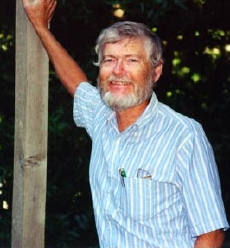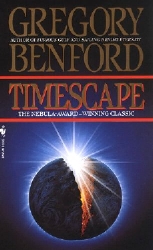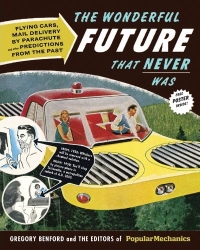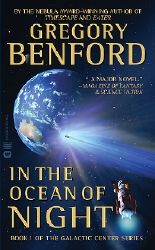
Every now and then when I ask someone to participate in EATING AUTHORS something shows up in my email that blows me away. Today’s guest, Gregory Benford, managed just that, as you’ll see below. Meantime, on the off chance that you’ve been living under a rock — or simply don’t read hard SF — let’s go over the numbers.
First, on the moh’s hardness scale, his fiction comes in easily at corundum or better. Dr. Benford is a card-carrying astrophysicist and by day is a professor at the University of California, Irvine. He’s been Hugo Award nominee four times, a Nebula Award nominee thirteen times (two of which he won), and took home the John W. Campbell Memorial Award for Best Science Fiction Novel for Timescape. He’s probably best known for the seven books and one novella that make up his Galactic Center Saga, but he has many other novels and a seemingly endless list of short stories to his credit.
Outside of his fiction, I first crossed paths with Greg just last year, when we were both judges for the 2012 Endeavor Award. I had the good fortune to see him last month at the Nebula Awards, where I got to thank him in person for his answer to this blog’s weekly question.

LMS: Welcome, Greg. So tell me, when and where and what was your most memorable meal?
GB: Trinity College, 1976. Undergraduates passed in gowns of dark blue. Martin Rees took us into a private dining room. I walked in with my wife Joan and saw at the table two men and their wives: Paul Adrien Maurice Dirac and Stephen Hawking. Martin had said nothing to alert us.
Newton, Nehru, and Maxwell were alumni of Trinity, and Dirac stood in such company; soon, so would Hawking and Rees.
The dining room was small, with room for six at the table. Soft lighting cast glows on the dark wood walls amid the scene of 700 years of academic elitism. The leadened plates stamped with the famed Trinity monogram framed a small salad. The flatware was heavy, dark silver and tall stemmed glasses ranked to the side. The servers wore formal tuxedo styled clothes and professionally disinterested faces. The headwaiter handled all dishes with white gloves and led the two solemn under-waiters.
I said very little through the crisp salad, letting Joan carry our side. She entertained them with stories to adapting to English home appliances, her tinkling laughter softening the atmosphere. I reflected. Dirac had won a Nobel in 1933 for the first relativistic theory of particles, the Dirac equation. “The great papers of the other quantum pioneers were more ragged, less perfectly formed than Dirac’s,†my friend Freeman Dyson had said to me when I was in graduate school. Freeman had taken Dirac’s Cambridge quantum mechanics course as a precocious 19-year-old. Of Dirac’s discoveries, Freeman said, “His papers were like exquisitely carved marble statues falling out of the sky, one after another. He seemed to be able to conjure laws of nature from pure thought.â€
This is an evening to keep your mouth shut, I thought, sitting at the centuries-old table and sipping a light Chardonnay (French, of course) served with the salad. Next, a tasty soup arrived, delicate in flavor and attended in strict silence by the stiff waiters. I noted that the French red wine was older than I was, a 1938 from the Fellows’ Cellar. A Haut Medoc, it was deep and rich with a surprising plum aftertaste.
Famously, Dirac’s wife Manci spoke little, and he even less. His colleagues in Cambridge jokingly defined a conversational unit of a dirac — one word per hour. Dirac was a slight man and autistic, widely known as hard to draw out. He said this concentration proved crucial to his success as a theoretical physicist, for he could remain focused on a problem for a long time. He also could order information about mathematics and physics in a systematic way, employing his visual imagination and determination. (Decades later, I saw medical practice focus on this supposed disorder, “fixing†it with drugs and therapy. How many geniuses have we lost this way?)
I asked him how he concentrated solely on his research. “Don’t talk,†he said with admirable brevity and a smile. He also said he only stopped work on Sunday, when he took long strolls alone. He had struggled to find the Dirac equation for months, getting nowhere, then took his usual Sunday walk — and the entire solution came to him when he was crossing a small bridge. He hurried to a nearby pub, asked for lunch and wrote the equation on the back of the menu so he would not forget. He seldom looked directly at anyone, but this time he stared me in the eye. “There it was, out of nowhere.â€
“Do you still have the menu?†I asked, eyes wide. When I said it would be a charming historical momento, he dismissively waved his hand. He had used it to start a fire in his chilly college rooms.
The Navy bean soup done, talk moved on. Some mention of English politics arose, at a time when Maggie Thatcher was moving to the fore, Martin squelched with, “I’m entirely infra-red,†which meant something like Trotsky. He had no wife then. Hawking’s wife rolled her eyes at this statement, saying nothing.
As the waiters smoothly placed delicious plates of veal ala brochard before us, Hawking changed the tone of the conversation with his halting words. He wanted to talk about science fiction. Martin had told him I wrote the stuff. I’d had the impression that at Cambridge science fiction was something serious scientists never would do, and seldom discuss — especially at a table where Newton changed the world over bowls of steaming lentil soup—and I said so. Hawking gave a slanted grin. “Fred Hoyle has left us, but he is not forgotten.â€
Hawking talked in slurred tones about what we now call his “chronology protection conjecture”. Why does nature apparently abhor a time machine? He said, “It seems that there is a Chronology Protection Agency which prevents the appearance of closed timelike curves and so makes the universe safe for historians.â€
Martin pointed out that there was strong experimental evidence in favor of the conjecture — from the fact that we have not been invaded by hordes of tourists from the future. All this discussion Hawking eventually included in a book in the 2000s, along with his fears that our TV broadcasts, would bring ravening aliens to our door. He thought about such speculations in the 1970s, but apparently kept them largely to himself during his climb to fame.
Dirac spoke about the walks he took around Cambridge, relating favorite routes in great detail, but otherwise had no small talk. Slowly Hawking turned the conversation around to what books we read, asking each of us. He then announced that since he was thirteen he had never bothered with the assignments in Literature classes, preferring science fiction. Dirac remarked, “In science one tries to tell people, in such a way as to be understood by everyone, something that no one ever knew before. But in poetry, and I suppose in fiction, it’s the exact opposite.â€
To my surprise Rees assented. “But science fiction leads to science,†he said. Dirac was silent and looked puzzled.
Stephen spent a long while relating memories of sf short stories he’d read. Like many fans, Hawking could recall ideas but not authors or titles. He was a big Robert Sheckley fan, I deduced, from what his remembered plots. Rees said he thought science fiction was like a literary dialect. It had its own vernacular and insider terms, its unusual pronunciation patterns and rhythms. A native sf “speaker†uses the argot of an audience, one that knows what Delany later called the sf reader protocols – signals of broader meaning. A good example is, “The door dilated,†implying a changed world. Nods all round, though Dirac said he had read little sf beyond Wells and Brave New World. “Perhaps I should.â€
We all agreed that aliens in fiction serve as a distorting mirror to show what humankind is not. Hawking spoke with jerky gestures, fighting the erosions from his Amyotrophic Lateral Sclerosis, which I knew as Lou Gehrig’s disease. His speech was slurred, brief and almost unintelligible, his conciseness a skill that later worked well in A Brief History of Time. Hawking’s fame was rising on his striking research ideas — that empty space wasn’t empty after all, and black holes aren’t black.
His wife, with her tight, focused look, scoffed at ideas like aliens, likening them to imaginary beings. Stephen retorted tartly that so were angels. A sudden silence around the table. I sipped the wine, which was excellent and still blossoming with rich new tones. This incident prefigured the issue of her Baptist faith versus his firm atheism, which eventually split them up.
Dessert was paradise, and I finished with a Cuban cigar. Ah, the days.

Thanks, Greg. I normally like to end here with a wry or light-hearted remark, but I’m just too stunned. We should all have such memorable meals.
Next Monday: Another author and another meal!
Tags: Eating Authors




One Response to “Eating Authors: Gregory Benford”